US Government Scientist Reveals New COVID Monitoring Device That Gets Implanted Under Skin; Pentagon researchers develop under-the-skin sensor that detects COVID infection, and other C-Virus Updates
US Government Scientist Reveals New COVID Monitoring Device That Gets Implanted Under Skin:
Technology and medicine could produce an implant that allows a person’s health to be tracked.
Retired Army Col. Matt Hepburn, who worked for years with the Defense Advanced Research Projects Agency, talked about the project in an interview that aired Sunday on the CBS show “60 Minutes.”
Hepburn — who still works for the Army as a physician and as “joint product lead,” according to his LinkedIn page — showed off the implant to Bill Whitaker of CBS, who noted how the device could be used.
“Consider a ship like the USS Theodore Roosevelt — hobbled last year when 1,271 crew members tested positive for the coronavirus. What if everyone on board had their health monitored with this subdermal implant, now in late-stage testing?” Whitaker said. “It’s not some dreaded government microchip to track your every move, but a tissue-like gel engineered to continuously test your blood.” —>READ MORE HERE
Pentagon researchers develop under-the-skin sensor that detects COVID infection:
The subdermal implant is reportedly a “tissue-like gel” that was engineered to continuously test the wearer’s blood
Pentagon researchers have created a sensor that can detect a COVID-19 infection in the blood.
The sensor, which is in late-stage testing, was unveiled by retired Colonel Matt Hepburn, an army infectious disease physician, during a segment of “60 Minutes” Sunday night.
The subdermal implant is reportedly a “tissue-like gel” that was engineered to continuously test the wearer’s blood.
“That tiny green thing in there, you put it underneath your skin and what that tells you is that there are chemical reactions going on inside the body and that signal means you are going to have symptoms tomorrow,” Hepburn told Bill Whitaker of “60 Minutes.”
Hepburn compared the sensor to a “check engine light” that alerts the body when something is amiss. The sensor can transmit information within three to five minutes, he said. —>READ MORE HERE
Follow links below to related stories and resources:
‘No Vaccine Passport Act’ proposed by House Republicans
USA TODAY: Coronavirus Updates
YAHOO NEWS: Coronavirus Live Updates
NEW YORK POST: Coronavirus The Latest







Comments are closed.